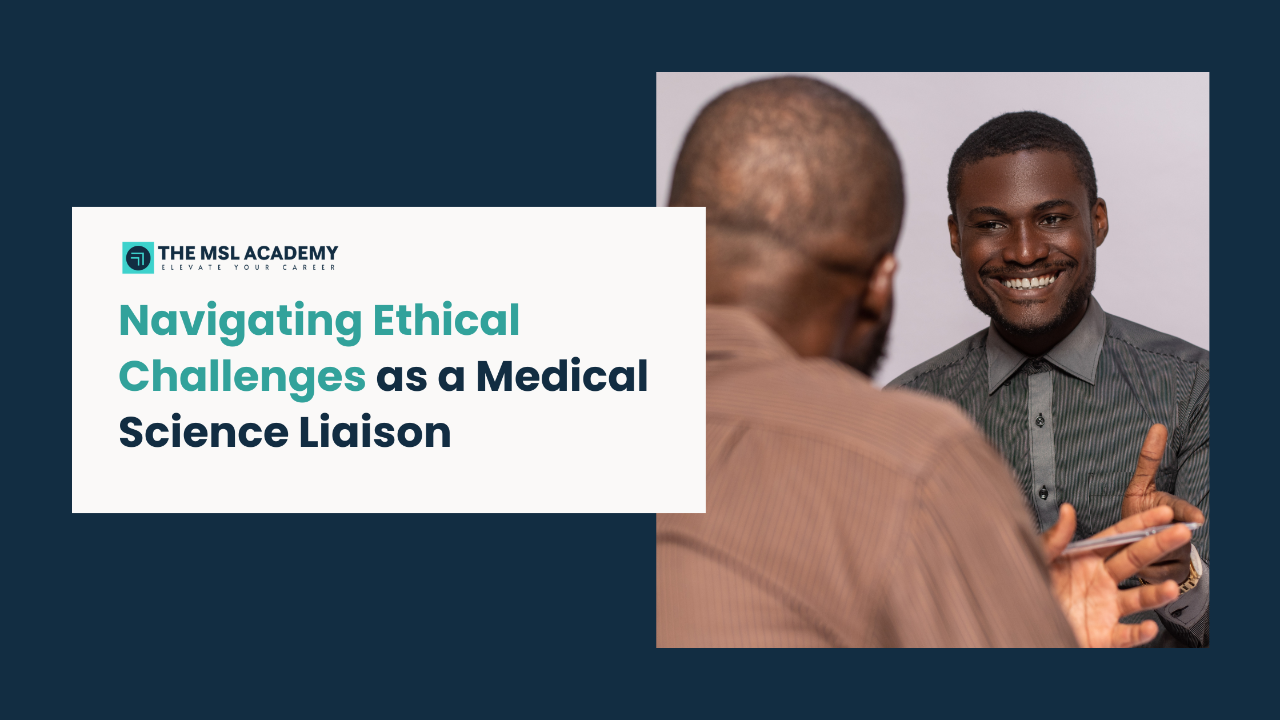Navigating Ethical Challenges as a Medical Science Liaison
Feb 15, 2025
Navigating ethical challenges is a critical component of a Medical Science Liaison’s (MSL) role. As the vital link between pharmaceutical companies and healthcare providers (HCPs), MSLs must carefully balance transparency, compliance, and professional integrity. Every conversation and decision you make not only reflects on your role but also has the potential to impact your organization’s reputation and, ultimately, patient outcomes.
The ethical dilemmas MSLs face are nuanced and often require quick, thoughtful decision-making. Understanding these challenges and how to address them is essential for maintaining credibility and building trust with stakeholders.
In this blog, we’ll explore common ethical challenges MSLs encounter, why they matter, and practical strategies for navigating them confidently while preserving your integrity and strengthening professional relationships.
Common Ethical Challenges in the MSL Role
1. Addressing Off-Label Use Questions
Off-label use discussions are among the most frequent and delicate ethical dilemmas MSLs face. While stakeholders often inquire about unapproved uses of a therapy, proactively discussing these applications can violate regulatory guidelines.
For example, a Key Opinion Leader (KOL) may ask how a drug could be used outside its approved indication to address a specific patient population. Responding without breaching compliance requires tact, clarity, and adherence to protocols.
2. Balancing Transparency with Confidentiality
Stakeholders value transparency and expect MSLs to share relevant, timely insights. However, it’s equally important to safeguard sensitive company information, such as unpublished data, pipeline details, or proprietary research.
Striking this balance ensures you remain a trustworthy resource without risking the integrity of your organization’s scientific communications.
3. Managing Bias in Scientific Exchange
One of the key responsibilities of an MSL is presenting data objectively. However, organizational priorities, such as emphasizing specific trial outcomes or preparing for a product launch, can inadvertently create pressure to lean into a particular narrative.
Maintaining objectivity and presenting data fairly, regardless of business goals, is critical to preserving credibility with stakeholders.
4. Dealing with Conflicts of Interest
Interacting with stakeholders who have competing affiliations or financial interests can place MSLs in complex ethical situations. For instance, a stakeholder may advocate for a competing therapy or have a partnership with another organization. Ensuring unbiased communication while maintaining a productive relationship requires a thoughtful and professional approach.
Why Addressing Ethical Challenges Matters
Ethical behavior is not just about following rules—it’s about fostering trust, building credibility, and ultimately contributing to better patient outcomes. Stakeholders rely on MSLs to be reliable, unbiased sources of information. Any misstep in handling ethical dilemmas can erode this trust and potentially impact long-term relationships.
How to Navigate Ethical Challenges
1. Stay Well-Versed in Regulatory Guidelines
- Regularly review and understand key regulations such as FDA guidelines, the PhRMA Code, and international equivalents like EFPIA (European Federation of Pharmaceutical Industries and Associations).
- Participate in compliance training sessions to stay up-to-date with evolving standards and ensure your practices align with regulatory expectations.
Being informed enables you to confidently navigate gray areas and handle stakeholder inquiries without hesitation.
2. Document and Record Interactions
- Keep detailed records of all stakeholder engagements, including the questions asked, the information shared, and any follow-up actions.
- Use documentation as a safeguard against potential misunderstandings or compliance audits.
For example, after a meeting with a KOL, summarize the key discussion points and document your responses to any off-label questions. This provides a clear record of your adherence to ethical and regulatory standards.
3. Handle Off-Label Questions with Care
- Acknowledge the stakeholder’s question and explain regulatory restrictions around off-label discussions.
- Offer to connect them with your Medical Information team or provide approved, publicly available resources.
Example Response:
“That’s a great question. However, discussing off-label uses isn’t something I can do directly. I’d be happy to connect you with our Medical Information team, who can provide you with the approved resources you need.”
By addressing the question professionally and redirecting appropriately, you maintain compliance while ensuring the stakeholder feels heard.
4. Build a Culture of Ethical Decision-Making
- Encourage open discussions with your team about ethical scenarios and best practices for handling them.
- Seek advice from mentors, compliance officers, or legal teams when faced with complex situations.
Collaborating with colleagues fosters a culture of integrity and ensures you’re equipped with multiple perspectives for addressing challenges effectively.
Case Study: Handling an Ethical Dilemma
Scenario:
During a meeting, a KOL asks about an unapproved use of a therapy under development.
Your Approach:
- You acknowledge the question professionally and explain that regulatory restrictions prevent you from discussing off-label applications.
- You offer to connect the KOL with your Medical Information team for further clarification.
- After the meeting, you follow up with an email providing approved documentation relevant to the therapy’s approved indications.
Outcome:
This approach demonstrates transparency and professionalism, ensuring compliance while maintaining the trust and respect of the KOL.
Proactive Tips for Ethical Excellence
- Practice Ethical Communication: Role-play ethical scenarios with colleagues to refine your responses to challenging questions.
- Develop a Compliance Mindset: Make compliance an integral part of your routine rather than an afterthought.
- Build Strong Relationships with Internal Teams: Cultivate close connections with Medical Information and Legal teams to streamline support when addressing ethical questions.
Final Thoughts
Ethics are at the heart of the MSL profession, influencing every conversation, decision, and stakeholder interaction. By staying informed, documenting your activities, and seeking guidance when needed, you can confidently navigate even the most challenging ethical dilemmas.
Being an ethical MSL is not just about protecting your organization—it’s about maintaining the trust and credibility that stakeholders rely on to advance patient care.
Looking for more support in handling ethical challenges? The MSL Academy offers tailored training, expert resources, and actionable strategies to help you approach these situations with professionalism and confidence.



